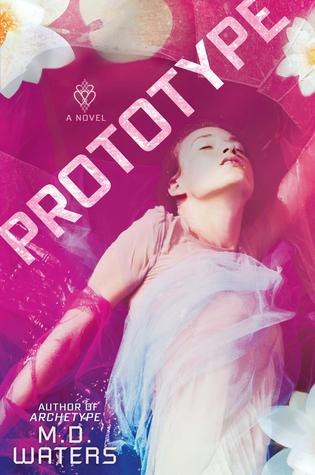Greetings, Bookworms!
If you’re not singing No Doubt’s “Just a Girl” right now based on the title of this post, please, by all means, put it on as background music. Now that I’m done foisting 90s ear worms on you, we can get down to business. Earlier this year I read and really enjoyed Archetype by MD Waters. I was overjoyed when I was offered a complimentary copy of the sequel, Prototype
, by the publisher for review consideration. *The manner in which this book was received in no way influences the honesty of the following review.*
 I can’t really accurately describe much about this book without giving away at least a few spoilers for the preceding novel. I’m going to try REALLY hard to be good, but if you’re really sensitive about such things, maybe come back after you’ve read Archetype
I can’t really accurately describe much about this book without giving away at least a few spoilers for the preceding novel. I’m going to try REALLY hard to be good, but if you’re really sensitive about such things, maybe come back after you’ve read Archetype just to be on the safe side. SPOILER ALERT! You still here? Excellent. Prototype begins about a year after Archetype‘s close. During the course of Archetype our heroine Emma learns through a series of unfortunate events that she was sold into slavery as a young girl, as fertile women have become an extremely valuable commodity. Her life is not at all what’s been presented to her during her recovery from a mysterious “accident.” Emma is, in fact, not who she thinks she is at all. Well. She is. And she isn’t. It’s COMPLICATED.
Anyhow, not everyone in the world is thrilled with the idea that women be sold as breeding stock, so there’s a big underground resistance operation that occasionally raids the training camps where they keep the girls and generally work to undermine the system. SUBVERT THE PATRIARCHY. Wooo! Emma learned of her own ties to the resistance, but because of REASONS, she chooses to leave on a quest to find her parents. Parents she can’t remember. Who sold her into slavery. Because that makes sense, Emma! Fictional characters can be terribly illogical.
In any case, adventures ensue, battles commence, and love threatens to unravel everything (as love is wont to do.) I liked this book, but some of the characters who were fairly complex in the first book took a decidedly Bond villain turn in this one. Don’t get me wrong, I like a good villain, but it seemed like a bit of a ploy to wrap up some complicated emotional baggage in a neat little bow. (To be clear, I wasn’t bothered by the tidy ending, just the Bond villains. I like my bad guys with layers.) While I didn’t love Prototype as much as Archetype, I thought it was a strong sequel and wrapped up the story in a satisfying manner. If you read and enjoyed Archetype, Prototype will give you the closure you crave.
Alright Bookworms. Time to sound off. Do like neatly packaged book conclusions, or do you prefer something a bit messier and open ended?
*If you make a purchase through a link on this site, I will receive a small commission.*



Megan M.
I definitely like having all of the major story questions answered, but sometimes an ending can be so tidy that it stretches believability, as when all of the characters end up romantically paired off in a very convenient way. That just doesn’t happen in real life… only in Hallmark movies.
Heather
It all depends on the book–some books do really well with open endings. (And then sometimes I want to hurl the book across the room.)
Jancee
Typically, I NEED resolution. I have invested so much into the characters and story, I want to know what happens and I don’t want to be left wondering. While some stories are best open-ended, for my part, I prefer neatly packaged closings.
Monika @ Lovely Bookshelf
I need some kind of resolution that feels realistic… sometimes that can be on the messy, open-ended side. I need plot points to feel resolved in SOME way, even if it’s just – for example – the character came to a realization that will help him/her move forward, or something like that. It doesn’t have to be tidy, but it needs to feel like a good place to stop. I feel like I’m babbling and not making sense. You know what I mean, though?
Jenny @ Reading the End
I like them open-ended within reason. I love it when the author ends the book in the moment right before someone makes a major decision, or right before a major conflict gets resolved, or like that — then I can imagine that the happy outcome has occurred, without feeling like the author was being unwarrantedly optimistic about Life. I like them open-ended as long as I have some pretty clear ideas in my head about what the ultimate ending would look like.